CHARLOTTE, N.C. -- United Methodist delegates repealed their church's longstanding ban on LGBTQ clergy with no debate on Wednesday, removing a rule forbidding "self-avowed practicing homosexuals" from being ordained or appointed as ministers.
Delegates voted 692-51 at their General Conference -- the first such legislative gathering in five years. That overwhelming margin contrasts sharply with the decades of controversy around the issue. Past General Conferences of the United Methodist Church had steadily reinforced the ban and related penalties amid debate and protests, but many of the conservatives who had previously upheld the ban have left the denomination in recent years, and this General Conference has moved in a solidly progressive direction.
Applause broke out in parts of the convention hall Wednesday after the vote. A group of observers from LGBTQ advocacy groups embraced, some in tears. "Thanks be to God," said one.
The change doesn't mandate or even explicitly affirm LGBTQ clergy, but it means the church no longer forbids them. It's possible that the change will mainly apply to U.S. churches, since United Methodist bodies in other countries, such as in Africa, have the right to impose the rules for their own regions. The measure takes effect immediately upon the conclusion of General Conference, scheduled for Friday.
"We've always been a big-tent church where all of God's beloved were fully welcome," said Bishop Tracy Smith Malone, the new president of the denomination's Council of Bishops and the first Black woman to serve in that role. She called the vote "a celebration of God breaking down walls."
She described the atmosphere in the room as a "Pentecost moment," in which the presence of the Holy Spirit was palpable.
The consensus was so overwhelming that it was rolled into a "consent calendar," a package of normally noncontroversial measures.
"It seemed like such a simple vote, but it carried so much weight and power, as 50 years of restricting the Holy Spirit's call on people's lives has been lifted," said Bishop Karen Oliveto, the first openly lesbian bishop in the United Methodist Church.
"People can live fully into their call without fear," said Oliveto, of the Mountain Sky Episcopal Area, which includes Colorado, Montana, Utah and Wyoming. "The church we've loved has found a home for us."
Also approved was a measure that forbids district superintendents -- or regional administrators -- from penalizing clergy for either performing a same-sex wedding or for refraining from performing one. It also prohibits superintendents from forbidding a church from hosting a same-sex wedding or requiring it to.
That measure further removes scaffolding around the various LGBTQ bans that have been embedded in official church law and policy. On Tuesday, delegates began taking such steps.
Delegates are also expected to vote soon on whether to replace the denomination's official Social Principles with a new document that no longer calls the "practice of homosexuality ... incompatible with Christian teaching" and that now defines marriage as between "two people of faith" rather than between a man and a woman.
The changes are historic in a denomination that has debated LGBTQ issues for more than half a century at its General Conferences, which typically meet every four years.
About 100 LGBTQ people and allies gathered outside the Charlotte Convention Center after the vote -- many with rainbow-colored scarves and umbrellas -- to celebrate, pray and sing praise songs accompanied by a drum.
Angie Cox, an observer from Ohio, said she has gone before her conference's board of ordained ministry six times but was "told no just because of the prohibition on LGBTQ clergy." She said Wednesday's vote "means I might be able finally to live fully into my calling."
Pinnacle View United Methodist Church Lead Pastor Betsy Singleton Snyder of Little Rock said she got a little emotional as Wednesday's vote neared, realizing that the restrictive language would finally be removed.
She had opposed the ban for years, and she leads an "open and affirming" congregation that welcomes everyone, she said.
"I just started crying, and one of my sons said, 'Mom, are those happy tears?'" Singleton Snyder recalled. "I said, 'Yeah, honey, these are real' -- and then I started to cry even more. 'These are real happy tears.'"
There's been a sweet spirit at this year's general conference that is evident even to those viewing the proceedings remotely, she said.
"It has been wonderful to watch it live-streamed," she added.
"This has been an injustice that the church has needed to address for a long time -- over 40 years," she said. "A lot of people have been harmed."
Delegates also voted this week to end a ban on using United Methodist funds to "promote acceptance of homosexuality," a change particularly welcomed by those in ministries working with LGBTQ+ people.
DEPARTURES
The vote follows the departure of more than 7,600 American congregations -- one-quarter of all UMC congregations in the U.S -- reflecting conservative dismay over the denomination not enforcing its LGBTQ bans. The departures took place between 2019 and 2023 under a temporary window enabling congregations to keep their properties under relatively favorable terms.
Congregations would have been able to leave over "reasons of conscience." Many conservative congregations accepted the offer, prompting an extraordinary decline for the geographically and culturally diverse denomination.
In Texas, for example, a historic stronghold, more than 40% of United Methodist congregations left the denomination. Some joined the breakaway conservative Global Methodist Church, while others have remained independent.
Many conservatives had been disturbed by what they saw as the church's failure to enforce its bans on gay clergy and same-sex weddings. Some leaders in more progressive regions had begun defying the restrictions, and the church now has a number of openly gay clergy and two gay bishops.
"This is certainly the lightning-rod issue, the presenting issue, but our division goes so much deeper," said Rob Renfroe, the president of Good News, a traditionalist caucus within the United Methodist Church. He described sexuality as a proxy issue for larger debates in the church about the authority of the Bible, the reality of sin and beliefs about salvation.
The conference on Wednesday voted formally to close the temporary window, over the pleas of conservatives who wanted it extended, particularly since the original window only applied to U.S. and not international churches.
"To limit its function to the United States (portion of the) United Methodist Church, that is a form of disfavor for the church in Africa," said the Rev. Jerry Kulah, a delegate from Liberia.
Dixie Brewster, a delegate from the Great Plains Conference covering Kansas and Nebraska, called for a path for her fellow conservatives to disaffiliate smoothly. "We want a place to go peacefully," she said. "We will not be disruptive. I do love all, I love my homosexual friends. I just view the Scriptures a different way."
But others said the disaffiliation process of recent years tore apart congregations and families.
"We cannot continue to center the voices of distrust," said delegate Lonnie Chafin from Northern Illinois.
Some pointed out there are other ways that congregations and entire conferences can still disaffiliate -- noting that the General Conference last week approved the departure of some churches in the former Soviet Union -- though others say this is overly burdensome.
SCHISM IN ARKANSAS
The schism in the United Methodist Church was felt in the Natural State as well. Since 2019, 164 Arkansas congregations have opted to disaffiliate, according to an analysis by the denomination's General Council on Finance and Administration.
Elizabeth Fink, a delegate from Arkansas who voted against Wednesday's change in language, said traditionalists are heavily outnumbered in Charlotte.
Her home congregation, First United Methodist Church in Stuttgart, was among those opting to disaffiliate and has dropped the word "United" from its name.
Some of the comments from delegates regarding congregations that have departed were "heartbreaking," said Fink, a student at Asbury Theological Seminary and a member of the Wesleyan Covenant Association global council.
"It hurt to hear them talk about ... grace for those who might want to come back to the UMC. But there wasn't any grace or wanting to see a peaceful way [forward] for those who have left or want to leave," she said.
Traditionalist congregations that failed to disaffiliate by the Dec. 31 deadline have likely missed their only opportunity to depart and keep their property, she said.
"There's no pathway there. They're not leaving any pathway for congregations that want to leave," she said.
Bishop Laura Merrill of the denomination's Arkansas Conference on Wednesday night issued a statement assuring church members that Wednesday's decision would not force churches to do anything and pushing back against what she called "voices from outside the UMC" trying to convince them otherwise.
"Let me be clear: the recent decisions of the General Conference do not require action from anyone," Merrill said. "While the removal of these restrictions comes as a joyous gift to some of our people and their families and congregations, others may not experience much difference at all. Still, others may be worried about what's next. Again, no one has to do anything in response."
Local leaders and members will still lead the way in their ministries, Merrill said, including in her statement a "conversation guide" advising members and clergy about how to decide whether or not to include same-sex marriage ceremonies in their ministries.
The guide states that clergy should not fear "civil legal action or punitive church action" that may come as a result of their decisions, as the decisions made by local pastors are protected by the First Amendment and the United Methodist Church's Book of Discipline.
"All who seek to know Christ are welcome in the United Methodist Church, and the relationships God has given you in your churches are a holy gift," Merrill said. "I therefore hope you will move slowly and prayerfully together."
This week's votes could prompt departures of some international churches, particularly in Africa, where more conservative sexual values prevail and where same-sex activity is criminalized in some countries.
The conference actions represent "a serious drift away from the truth," Kulah said in an interview. "The church is now buying into culture. The Bible has not changed, but the church has changed."
Last week, the conference endorsed a regionalization plan that essentially would allow the churches of the United States the same autonomy as other regions of the global church. That change -- which still requires local ratification -- could create a scenario where LGBTQ clergy and same-sex marriage are allowed in the United States but not in other regions.
The church's 1972 General Conference approved a statement in its non-binding Social Principles that homosexuality is "incompatible with Christian teaching" -- a phrase omitted in a proposed revision to the Social Principles that is also headed for a conference vote this week.
The now-repealed ban on clergy who are "self-avowed practicing homosexuals" was originally enacted in 1984, when the conference also voted to require "fidelity in marriage and celibacy in singleness."
The denomination had until recently been the third-largest in the United States, present in almost every county. But its 5.4 million U.S. membership in 2022 is expected to drop once the 2023 departures are factored in.
The denomination also counts 4.6 million members in other countries, mainly in Africa, though earlier estimates have been higher.
Information for this article was contributed by Peter Smith of The Associated Press, Ruth Graham of The New York Times and by Frank E. Lockwood and Grant Lancaster of the Arkansas-Democrat Gazette.
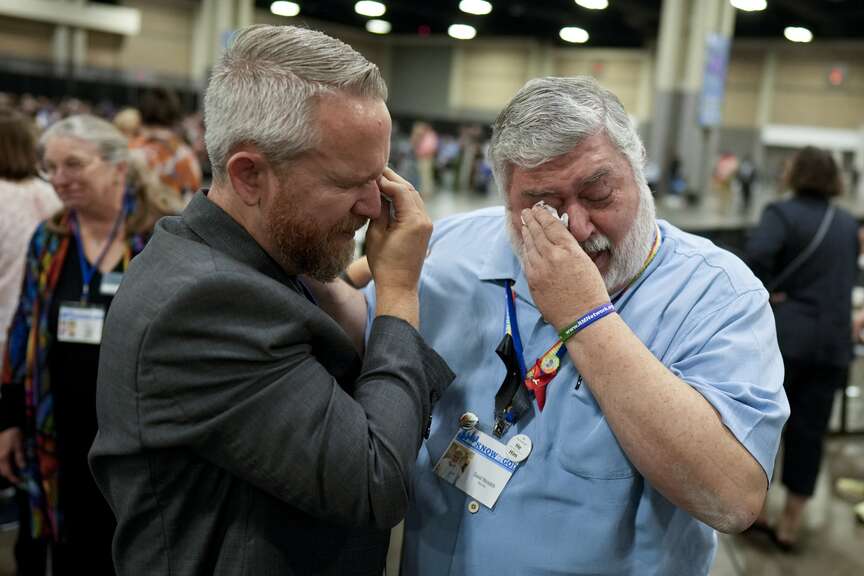 CORRECTS ID: Rev. Andy Oliver, Pastor of Allendale UMC in St. Petersburg, Florida, left, and David Meredith wipe away tears after an approval vote at the United Methodist Church General Conference Wednesday, May 1, 2024, in Charlotte, N.C. United Methodist delegates repealed their church's longstanding ban on LGBTQ clergy with no debate on Wednesday, removing a rule forbidding "self-avowed practicing homosexuals" from being ordained or appointed as ministers. (AP Photo/Chris Carlson)
CORRECTS ID: Rev. Andy Oliver, Pastor of Allendale UMC in St. Petersburg, Florida, left, and David Meredith wipe away tears after an approval vote at the United Methodist Church General Conference Wednesday, May 1, 2024, in Charlotte, N.C. United Methodist delegates repealed their church's longstanding ban on LGBTQ clergy with no debate on Wednesday, removing a rule forbidding "self-avowed practicing homosexuals" from being ordained or appointed as ministers. (AP Photo/Chris Carlson)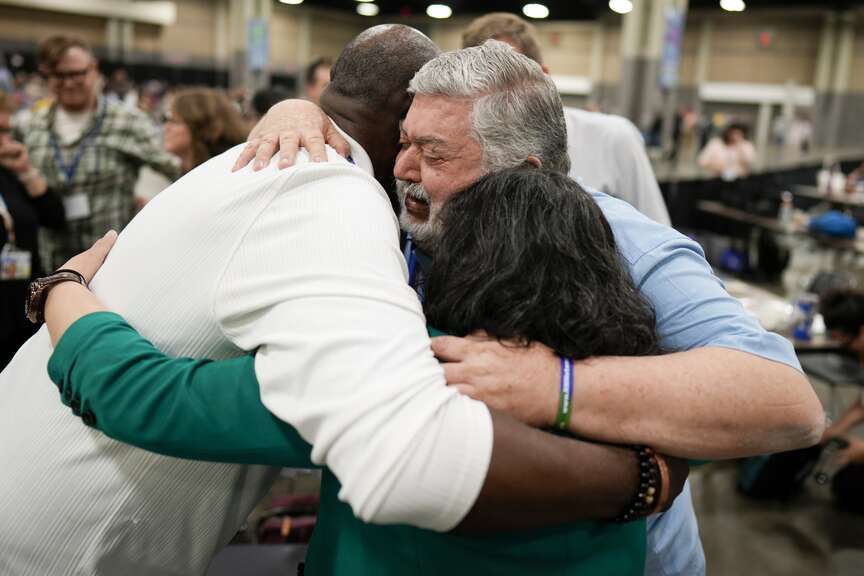 David Meredith, middle, hugs fellow observers after an approval vote at the United Methodist Church General Conference Wednesday, May 1, 2024, in Charlotte, N.C. United Methodist delegates repealed their church's longstanding ban on LGBTQ clergy with no debate on Wednesday, removing a rule forbidding "self-avowed practicing homosexuals" from being ordained or appointed as ministers. (AP Photo/Chris Carlson)
David Meredith, middle, hugs fellow observers after an approval vote at the United Methodist Church General Conference Wednesday, May 1, 2024, in Charlotte, N.C. United Methodist delegates repealed their church's longstanding ban on LGBTQ clergy with no debate on Wednesday, removing a rule forbidding "self-avowed practicing homosexuals" from being ordained or appointed as ministers. (AP Photo/Chris Carlson)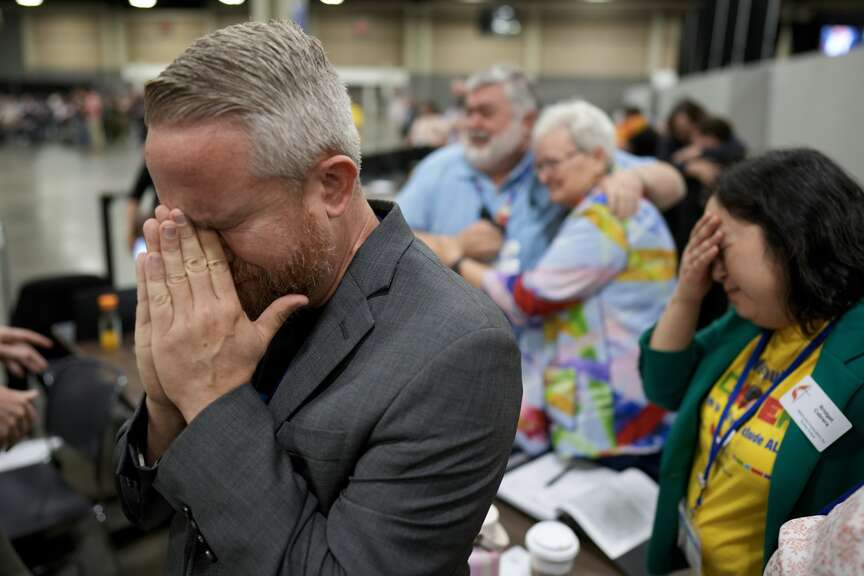 CORRECTS ID: Rev. Andy Oliver, Pastor of Allendale UMC in St. Petersburg, Florida, reacts after an approval vote at the United Methodist Church General Conference Wednesday, May 1, 2024, in Charlotte, N.C. United Methodist delegates repealed their church's longstanding ban on LGBTQ clergy with no debate on Wednesday, removing a rule forbidding "self-avowed practicing homosexuals" from being ordained or appointed as ministers. (AP Photo/Chris Carlson)
CORRECTS ID: Rev. Andy Oliver, Pastor of Allendale UMC in St. Petersburg, Florida, reacts after an approval vote at the United Methodist Church General Conference Wednesday, May 1, 2024, in Charlotte, N.C. United Methodist delegates repealed their church's longstanding ban on LGBTQ clergy with no debate on Wednesday, removing a rule forbidding "self-avowed practicing homosexuals" from being ordained or appointed as ministers. (AP Photo/Chris Carlson)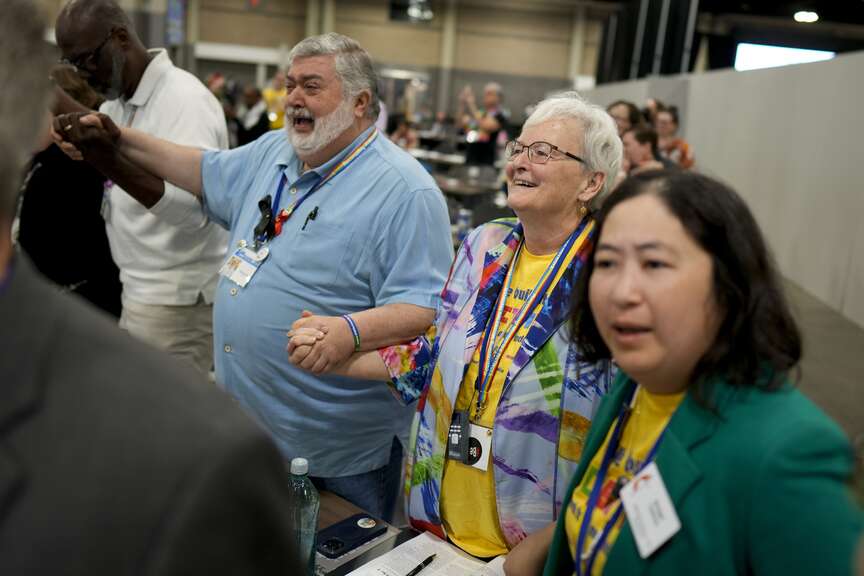 David Meredith, left, and Jan Lawrence react after an approval vote at the United Methodist Church General Conference Wednesday, May 1, 2024, in Charlotte, N.C. United Methodist delegates repealed their church's longstanding ban on LGBTQ clergy with no debate on Wednesday, removing a rule forbidding "self-avowed practicing homosexuals" from being ordained or appointed as ministers. (AP Photo/Chris Carlson)
David Meredith, left, and Jan Lawrence react after an approval vote at the United Methodist Church General Conference Wednesday, May 1, 2024, in Charlotte, N.C. United Methodist delegates repealed their church's longstanding ban on LGBTQ clergy with no debate on Wednesday, removing a rule forbidding "self-avowed practicing homosexuals" from being ordained or appointed as ministers. (AP Photo/Chris Carlson)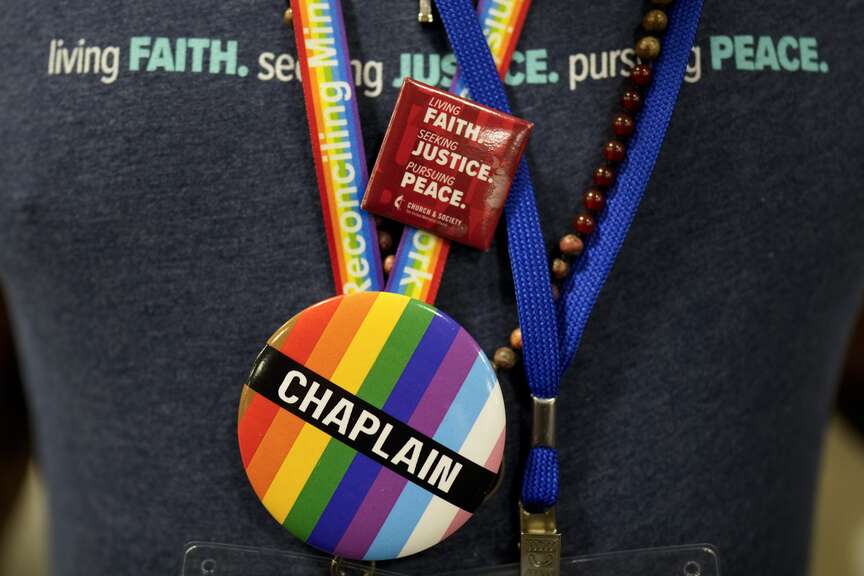 A convention goer wears a button supporting LGBTQ clergy at the United Methodist Church General Conference Wednesday, May 1, 2024, in Charlotte, N.C. United Methodist delegates repealed their church's longstanding ban on LGBTQ clergy with no debate on Wednesday, removing a rule forbidding "self-avowed practicing homosexuals" from being ordained or appointed as ministers. (AP Photo/Chris Carlson)
A convention goer wears a button supporting LGBTQ clergy at the United Methodist Church General Conference Wednesday, May 1, 2024, in Charlotte, N.C. United Methodist delegates repealed their church's longstanding ban on LGBTQ clergy with no debate on Wednesday, removing a rule forbidding "self-avowed practicing homosexuals" from being ordained or appointed as ministers. (AP Photo/Chris Carlson)
